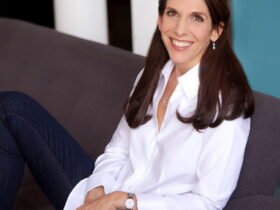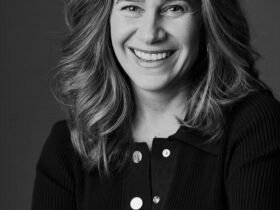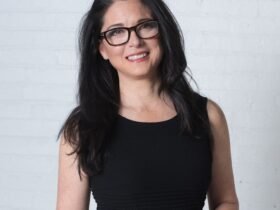Jennifer Levin shares how caregiving upended her life, and why it’s time we all start preparing to be caregivers for our loved ones.
Caregiving isn’t something we post about on Instagram or add to our résumés, but for millions of Americans, it’s an invisible, all-consuming role that’s redefining what our daily lives look like. And there’s never been a more urgent time to talk about it. Right now, we’re in the thick of what the Alliance for Lifetime Income calls Peak 65—the window from 2024 to 2027 when more Americans than ever before will turn 65. For many families, including Jennifer Levin’s, that milestone means stepping into caregiving roles with little warning, limited resources, and even less recognition.
This week, on the HerMoney Podcast, Jean Chatzky is joined by Jennifer Levin. At just 32, she became a full-time caregiver for her father, taking time away from a career she loved, halfway across the country, to be there for him. She’s written about the experience in her powerful new book: “Generation Care: The New Culture of Caregiving.” It’s a lifeline for anyone navigating care, especially for younger caregivers. Today, we’re digging into the rage, the resilience, and the reforms we urgently need to make caregiving more sustainable in America.
The Financial Toll: How Caregiving Quietly Reshapes Your Life
Jean Chatzky: One of the decisions that you made was not to step out of the workforce. There comes a point in many caregiving journeys when that’s the choice. Do I step out and take care of my relative, my loved one, or do I try to stay in the workforce and hire somebody to help me? You did the latter. Why did you decide to do that?
Jennifer Levin: I would say that it wasn’t even a choice. It was so ingrained in me to continue building my career, and I knew that upending my own life in every significant way was not something that my dad wanted. Other people feel very differently when it comes to family care, and they only trust family. But for me, it wasn’t a choice. It was, I’ve worked hard to get where I am. Keep going.
At the time that my dad was first diagnosed, I was working in TV production in a writer’s room, and you really have no control over your own life. It was as long as my bosses were there, I was there. So I thought at a certain point, this is not how I want my life to look. Knowing that my father and my family, and the people in my life, are such a priority, I don’t want to devote every waking moment to only this one thing in my life. I want space for other things.
And so I did make the decision to start working for myself, which was not easy. I think that it sounds very empowering, and it can be when you begin, but you’re letting go of a regular paycheck and health insurance benefits in the way that you’re used to receiving them. There’s a lot of risk involved in that. It allowed me flexibility to go back and forth as I needed to and as I wanted to, just to be there with him because I loved my dad. We spent a lot of time together when he was healthy, so of course, when he needs help, I’m gonna be there just as much to help him, but really just to spend time with him.
What Can Help: Community, Conversations, and a Lot More Preparation
Jean Chatzky: At that point, you said that the life that you built for yourself was quote unquote layered with consuming responsibility. You managed Medicare, you dipped into your own savings to hire a private nurse’s aide, you became your dad’s healthcare proxy. You were still working back in LA. That is a lot for a 32-year-old. Were you ready for this? Is there any way that people can be ready for this?
Jennifer Levin: I’ll say I was absolutely not ready for it. Like most people my age, it’s kind of trial by fire. When you’re 32, you’re still identity-building in many ways, and building your own life and figuring out health insurance for yourself, frankly, which is already confusing. I had no experience with Medicare or long-term care, or geriatric care. That was all completely new.
When I hear about other people who are going through this, particularly at a younger age like I was, my advice to prepare yourself for it is to really find support in a community of other people your age who are going through it. One, because you’re going to need emotional support, but two, to have somebody else modeling the experience of what you’re going through. There’s no handbook for this, and there’s no list of things of every specificity that your family is going to need to address. But when you can look at somebody else’s experience, you can say, “Wait a minute, that sounds like something I should pay attention to. I didn’t know this was available.” And it gives you a list of resources to act from.
Final Word: The Caregiving Revolution Is Coming, Let’s Get Ready
Jean Chatzky: Now that you have come through the other side, are there a couple of pieces of advice that you have for people who are either going through it or know that they might go through it at some point? I’ve always felt that we don’t have enough insight into our parents’ financial lives and what they want, and that if we can get ourselves to the point where we can understand what’s on the other side is a huge benefit. But what do you see being the steps that people should be taking that they are not?
Jennifer Levin: The first step to be proactive would be getting the paperwork in order and finding out what your parent, if it’s a parent that you anticipate caring for, already has in place, and what they don’t. With things like a medical proxy, with things like a living will, know passwords to different bank accounts, and know what utility companies they have. Have these conversations before the conversation gets too loaded with emotion. And bring in an elder care attorney, one who’s licensed in your state, so they know the particulars of the laws in your state. They can really help you sort through the basic paperwork that you should have in place before this becomes a really big deal, if you’re able to think about it so far ahead.
Then later on, this one woman I talked to was in her early thirties, also caring for her chronically ill spouse, who has long COVID. One of the things that has helped her even before he became ill, she decided to dial back her work schedule to work an 80% schedule and negotiate that with employers so that she didn’t lose her career track, but she was able to have more time with her children. While the balancing act is incredibly difficult, she does have a structure in her life that allows her a little bit more time for family care. I think re-envisioning your life and what that looks like is really helpful.
… Does more financial confidence sound good to you? We thought so! We’d love for you to join us at our two all-star hands-on financial wellness programs:
🚀 FinanceFixx – HerMoney’s 4 or 8-week Money Makeover financial coaching program that will help you get your finances on track!
📈 InvestingFixx – HerMoney’s investing club for women who are ready to learn market lingo, and grow their wealth. Your first month with us is completely free!
MORE ON HERMONEY:
More money news when you need it! Get the latest and greatest updates on all things investing, budgeting, and making money. Subscribe to the HerMoney newsletter at Hermoney.com/subscribe!



















Leave a Reply